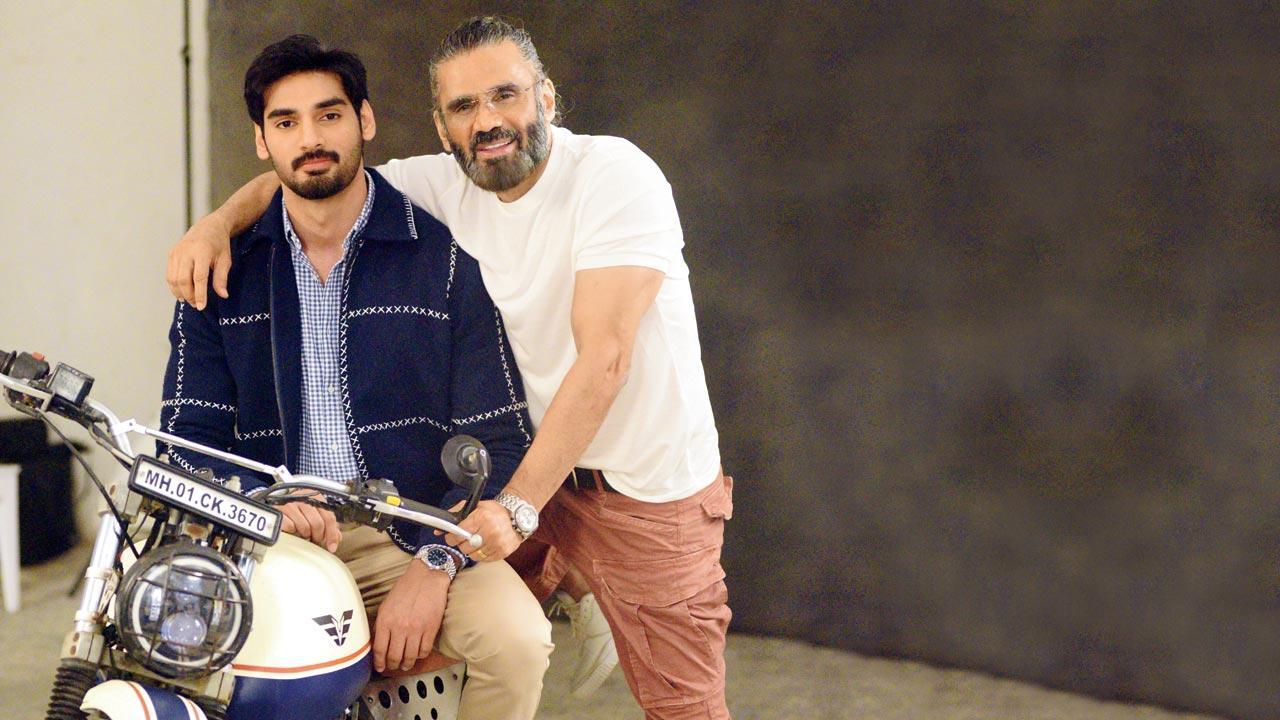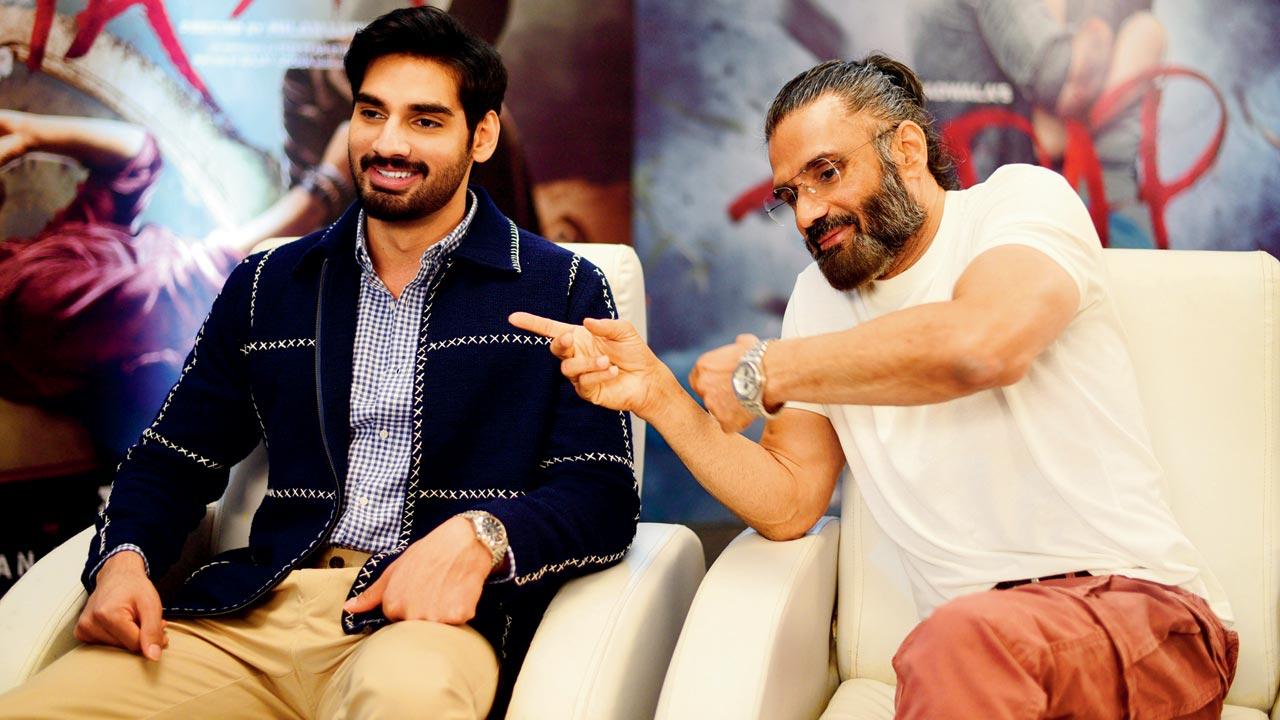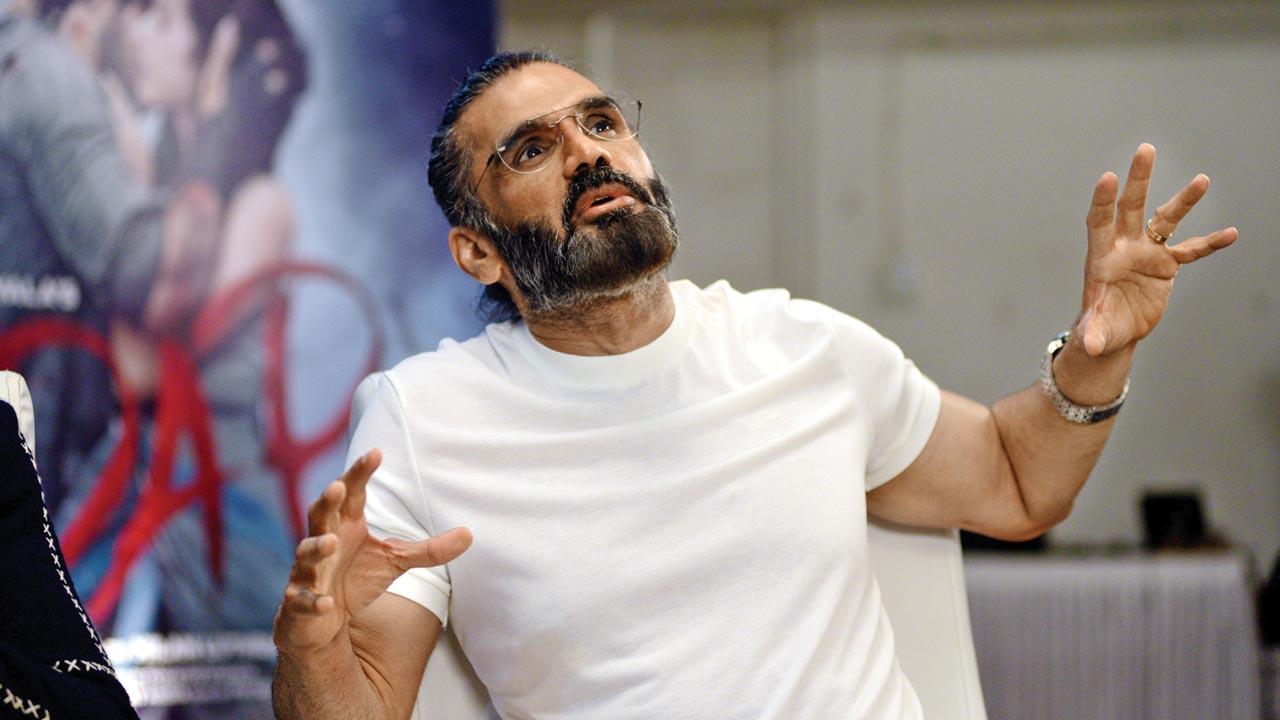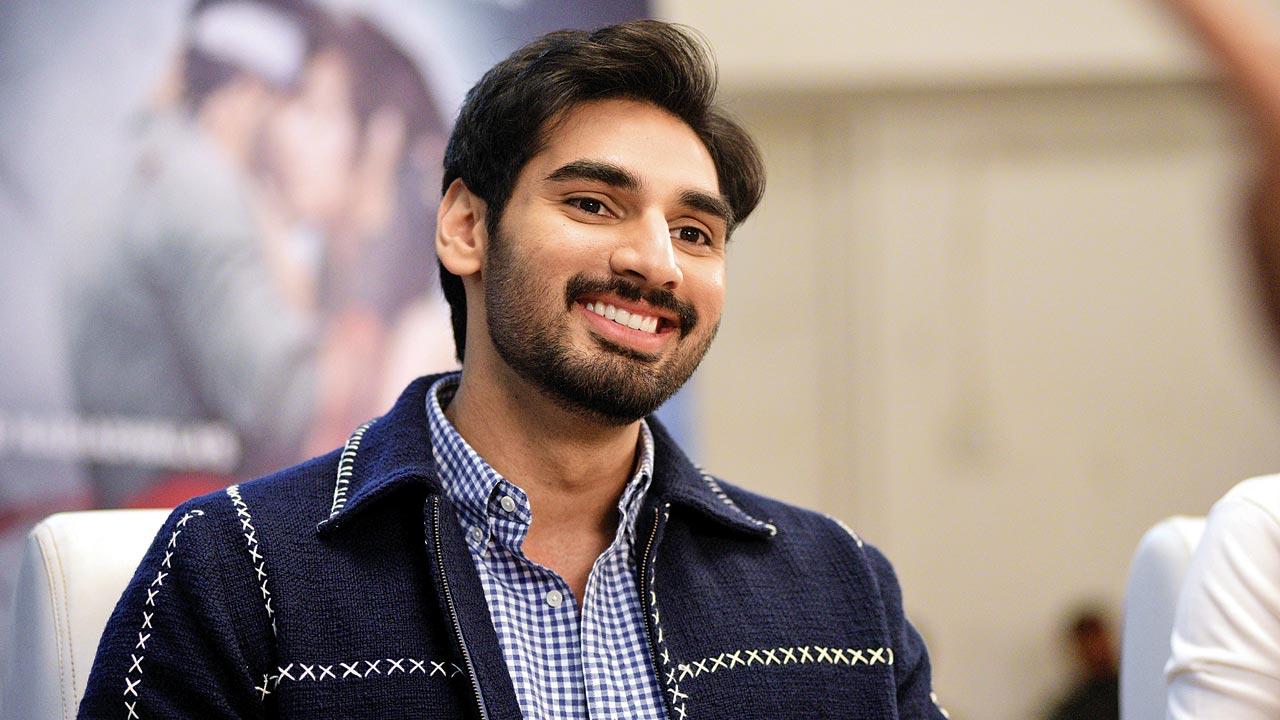In a freewheeling interview, their first together, Ahan and Suniel Shetty talk shop: Hard work, good acting, thumping success. And yes, humility

Ahan and Suniel Shetty at Mehboob Studios in Bandra make time for a photograph in between pre-release promotions for Tadap. Pics/Ashish Rane
At the end of the interview, this writer whips out her phone to message a friend: If this is what 60 can look like, we needn’t be afraid.
Camel cargos, white tee, and a chic man bun, actor Suniel Shetty is on time, ready to handshake hello at Bandra’s Mehboob Studio. His generation remembers him as the soft-spoken action star, having found fame with movies like Mohra, and later as the Supandi-style funny man in Hera Pheri, and the dark lover to Shilpa Shetty in Dhadkan. These days he is experiencing an excitement not very different from those days. Ahan Shetty, 25, debuts in Bollywood this Friday with Milan Luthria-directed Tadap. Produced by Sajid Nadaidwala, it stars Tara Sutaria opposite him in a love-gone-sour tale.
Ahan takes a seat beside his father, the Tulu genes shining bright. Ebony haired, he is strapping but smiles readily; he looks sure of himself without being cocky. Together, they make the unlikely celebrity dad and unusual star kid. In a freewheeling interview, their first together, they speak of living the “un-Bollywood life”.
Edited excerpts from the interview.
The industry that Ahan has stepped into must seem radically different from the one you have worked in since 1992.
Suniel Shetty: I don’t think there is that massive a change. But yes, numbers have become more important. We used to have a ‘house-full’ board back then, now box office returns are important. There is a lot more transparency. The kids [making their debut] are more prepared, and this is not true of just my son, but for all young people. It took me 25 films to achieve the quality of work they are putting out in their first movie. I ask Ahan, ‘How do you guys do it?’ I think we came in as professionals to become stars, they have come to become actors, and deliver to the expectations of the audience. That’s what makes it so exciting.
 Ahan Shetty makes his debut with Tadap this Friday
Ahan Shetty makes his debut with Tadap this Friday
Ahan, you have been training for a film career since you were 11, taking classes in acting, dancing and action. You say, you landed this film on merit.
Ahan Shetty: I think there is more visibility because my father is an actor, and I have met directors and producers in an informal setting [because of him]. I don’t want to say it’s harder [if you are a star kid]. It’s hard. Period. There is [extra] pressure. They do want to see me do the same thing he did. But I cannot let it get to me. You lose your sense of direction, and start listening to other people. You have to keep your head down, and keep the noise away.
There was an interview of Harrison Ford where he says he meets Reese Witherspoon in the parking lot when he drops his kids to school. Your parents are like that too, aren’t they? It was a “normal “ childhood?
AS: Absolutely. Athiya and I went to the American School, so it didn’t matter who my father or mother was. They would come for the football games and every other school event. Dad was extra supportive; he’d walk down to the field, and I had to tell him, “calm down”. Despite a long career in the industry, he hasn’t been part of Bollywood in a sense. He wanted us to stay away from the limelight.
SS: The intention of putting them in the American School was not to prove that we are a cut above the others, but to make it clear that nobody there cares about who you are. You miss PTA, you are on the watch list. I had to know what was happening in my son’s life. I went to school like any other parent would. That’s in my lineage. We are simple. Everyone [in the family] was interested in art and architecture... normal people. There is a reason why he has grown into who he is.
AS: Dad took us to the 2003 Cricket World Cup, and school was on at the time. They allowed me to go, but after asking me to write a report on my experiences.

How have you maintained this balance between freedom and discipline?
SS: We were always their friends. And we befriended Athiya before Ahan. There was no distinction. She was busy looking at schools, and then she said she wanted to be an actor, and it took me five minutes to tell her, then follow that dream. Even with Ahan... [I told him] don’t do what you don’t want to. My dream was to play for the country; his inclination was towards art and drama. He took up drama as a major in high school, and travelled with his drama teacher all over the world.
What if Bollywood doesn’t work out? Do you have a Plan B?
AS: No. This is the only plan. If I had an alternative, I wouldn’t be as committed or dedicated.
The industry is top light, and bottom heavy. The same few stars, and the serious actors, and then some newcomers. As a fresher, are you ready to do it all, even if it’s a gig on OTT?
AS: Definitely. I am happy that my first film is going to a theatrical release, but I am totally open to acting in a web series. It gave a lot of people work during the last few years. I want to do it all; it’s all only about the performance.

In Tadap, you play a dark character. How did you view this experience?
AS: It was great to play a character who displays contrasting personalities. It was almost like a double role. When I challenge myself, I do well. I was very thankful to Milan and Sajid for that.
SS: I am an extremely emotional person, and it hasn’t sunk in [that he’s making his debut]. It’s not a typical star son launch—there is no dancing, beautiful clothes or martial arts. He plays a normal guy. My first cheque came from Sajid Nadiadwala, and three decades later, he has given my son his first cheque. And then there is Milan. Ahan needed a guru, and Milan is that. I watched the movie and asked Ahan, “Are you uncomfortable with romance?”, and he said “No, dad. This boy is a small town guy. He has never touched a girl.” I knew then that he had got into character.
The film industry has been under intense scrutiny recently over ethics. Has Suniel passed on a lesson or two?
AS: He told me never fear Fridays. Don’t be scared. You learn from failure. When I decided to be an actor, he told me if you can’t be known as a good actor, be known as a good human being. Just be who you are.
SS: Honestly, I think that kids watch and learn. It’s about how I have led my life, respected my directors, producers, or the light men and spot boys. People have always told me, oh this one is so big, that one is so big! I say, if you really want to know who is big, ask the fighter boy who just got hurt: who is the one who asked him if he is fine? In the past, actors like us interacted with our unions; that’s not the case anymore. That’s why when someone is banging and hammering you, no one stands up for you. They did for Sanjay Dutt and Salman Khan. When they were going through hell, people stood up.
OTT screening platforms were like oxygen for the industry in the last two years. But the father [of entertainment] is cinema. We shouldn’t take it for granted, and we need to deliver good content consistently.
Also Read: Ahan Shetty: After release, I’ll know if I deserve to be here
 Subscribe today by clicking the link and stay updated with the latest news!" Click here!
Subscribe today by clicking the link and stay updated with the latest news!" Click here!










